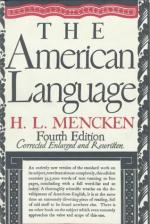|
This section contains 289 words (approx. 1 page at 400 words per page) |

|
Chapter 3.5 Summary
Discussing pronunciation before the Civil War, the author introduces the chapter with a reminder that people like Noah Webster "sneered" at the broad a. This particular pronunciation was, again, considered an "Anglomaniac affectation." However, Webster changed his mind within twenty-five years, Mencken says. Having authority and ordaining the accepted use of the broad a, Webster influenced what is now the current pronunciations of ask, last, master, pastor, and others, adding over the years to handsome, caterpillar, apple, and more. Other authorities protested, but, with the New England schoolmasters in agreement with Webster, the complaints held no weight. Alternately, Mencken tells, Webster failed to influence and gain support for other forms of English pronunciation. His trying to get a word such as deaf pronounced deef, for instance, only lasted a bit.
Chapter 3.5 Analysis
The English Language was protected by the original speakers, so much...
(read more from the Chapter 3.5 Summary)
|
This section contains 289 words (approx. 1 page at 400 words per page) |

|




